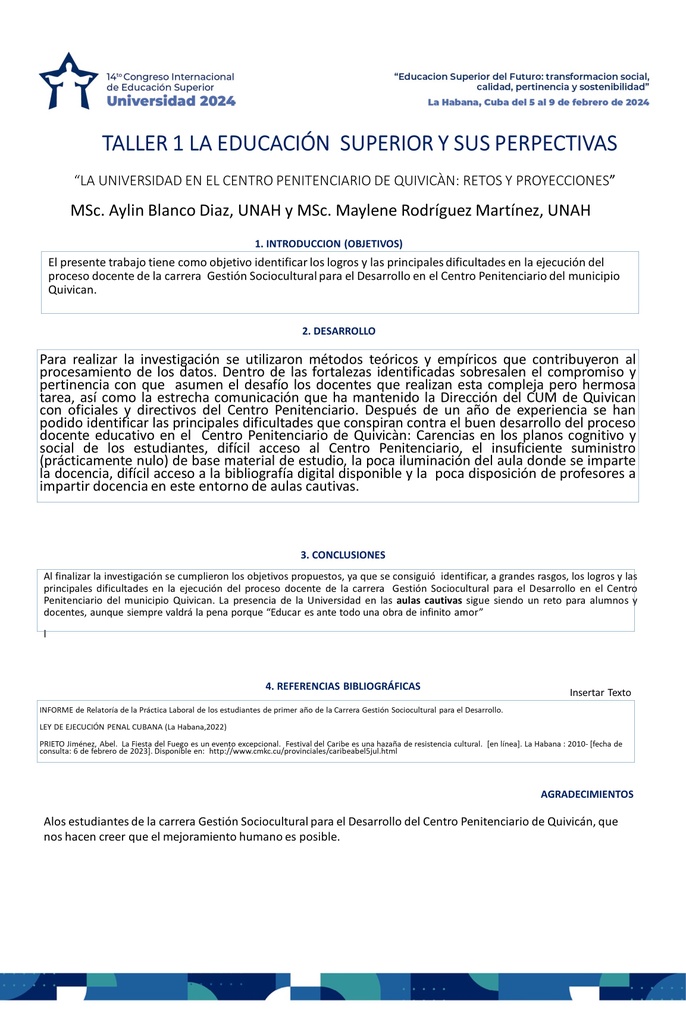
Simposio 1. La Educación Superior y los retos para el futuro: internacionalización, transformación digital, financiación y perspectiva informacional.
PER
XVII Taller Internacional “La Educación Superior y sus Perspectivas”

Resumen
En las prisiones cubanas se realizan acciones para elevar la cultura general de los internos. La oportunidad de cursar estudios universitarios que ofrece el gobierno revolucionario, representado en este caso por el Ministerio de Educación Superior (MES), a las personas privadas de libertad refleja una voluntad política con una perspectiva coherente con los Derechos Humanos. El Centro Universitario Municipal (CUM) de Quivican, en representación de la Universidad Agraria de la Habana, asume la responsabilidad de impartir la carrera de Gestión Sociocultural para el Desarrollo a un grupo de internos del Centro Penitenciario enclavado en el municipio, lo cual constituye un reto ya que en ocasiones resulta necesario ajustar los planes de estudios y programas, así como las tecnologías para el aprendizaje. El presente trabajo tiene como objetivo identificar los logros y las principales dificultades en la ejecución del proceso docente de la carrera Gestión Sociocultural para el Desarrollo en el Centro Penitenciario del municipio Quivican. Para realizar la investigación se utilizaron métodos teóricos y empíricos que contribuyeron al procesamiento de los datos. Al finalizar la investigación se cumplieron los objetivos propuestos, ya que se consiguió identificar, a grandes rasgos, los logros y las principales dificultades en la ejecución del proceso docente de la carrera Gestión Sociocultural para el Desarrollo en el Centro Penitenciario del municipio Quivican. La presencia de la Universidad en las aulas cautivas sigue siendo un reto para alumnos y docentes, aunque siempre valdrá la pena porque “Educar es ante todo una obra de infinito amor”
Abstract
In Cuban prisons, actions are carried out to raise the general culture of inmates. The opportunity to pursue university studies offered by de revolutionary government, represented in this case by the Ministry of Higher Education , to people deprived of liberty reflects a political will with a perspective consistent with Human Rights . The Municipal University Center of Quivican , on behalf of the Agrarian University of Havana, assumes the responsibility of teaching the career of Sociocultural Management for Development to a group of inmates of the Penitentiary Center located in the municipality, which is a challenge since sometimes it is necesary to adjust the curricula and programs, as well as the technologies for learning. The present work aims to identify the achievements and the main difficulties in the execution of the teaching process of the career Sociocultural Development in the Penitentiary Center of the Quivican municipality. To carry out the research, theoretical and empirical methods were used that contributed to the processing of the data. At the end of the research, the proposed objectives were met, since it was possible to identify, broadly speaking , the achievement and the main difficulties in the execution of the teaching process of the teaching process of the Sociocultural Management for Development career in the Penitentiary Center of the Quivican municipality. The presence of the University in the captive classrooms continues to be a challenge for estudent and teachers, although i twill always be worth it because « Educating is first and foremost a work of infinite love »
Sobre el ponente

Aylin Blanco Diaz
